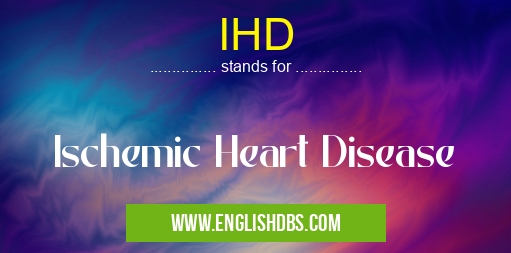What does IHD mean in MEDICAL
Ischemic Heart Disease (IHD) is a type of cardiovascular disease that results from reduced blood flow to the heart. It is often caused by a narrowing or blockage in the coronary arteries, which are the vessels that supply oxygen-rich blood to the heart muscles. IHD can lead to chest pain (angina), heart attack, and other complications such as abnormal heart rhythms (arrhythmias) and congestive heart failure. This article will provide an overview of IHD, including relevant FAQs.

IHD meaning in Medical in Medical
IHD mostly used in an acronym Medical in Category Medical that means Ischemic Heart Disease
Shorthand: IHD,
Full Form: Ischemic Heart Disease
For more information of "Ischemic Heart Disease", see the section below.
Essential Questions and Answers on Ischemic Heart Disease in "MEDICAL»MEDICAL"
What causes IHD?
The most common cause of IHD is atherosclerosis, which is the buildup of plaque inside arteries that supplies blood to the heart muscle (coronary arteries). Plaque consists of fat, cholesterol, calcium and other substances found in debris in circulation. When plaque builds up inside an artery, it narrows the passage for blood flow and makes it more difficult for oxygen-rich blood to reach the heart muscle. Other causes of IHD include diabetes, hypertension (high blood pressure), smoking, stress, family history and age.
What are some risk factors for IHD?
Common risk factors for developing IHD include high levels of low-density lipoprotein or “bad†cholesterol; high triglyceride levels; diabetes; hypertension; family history; being overweight or obese; physical inactivity; smoking tobacco products; and aging. Any combination of these factors increases your risk for developing IHD.
What are symptoms of IHD?
Symptoms of IHD vary depending on the severity level but may include chest discomfort or pain (angina), shortness of breath during activity or rest, dizziness or lightheadedness, nausea and fatigue with no known cause.
How is IHD diagnosed?
Your doctor may use various tests and exams to diagnose IHD including physical exam and medical history review, echocardiogram (ultrasound imaging test), electrocardiogram (ECG/EKG), stress tests/exercise tests/stress ECGs, chest X-ray/CT scan/MRI scan and angiography.
Are there treatments available for IHD?
Treatment options depend on an individual's condition but may include lifestyle changes such as quitting smoking, increasing physical activity level and making changes to one's diet; medication such as nitrates/beta blockers/calcium channel blockers/ACE inhibitors/diuretics/blood thinners etc.; surgical procedures like coronary angioplasty or bypass surgery; or other methods like electrical stimulation therapy.
Final Words:
 Ischemic Heart Disease is a serious cardiovascular condition that can lead to many dangerous health issues if not treated properly. Knowing your risk factors can help you take steps towards reducing your chances of developing this condition. If you have any concerns about your cardiovascular health it is important that you speak with your doctor as soon as possible so they can properly diagnose your condition and provide necessary treatment options if needed.
